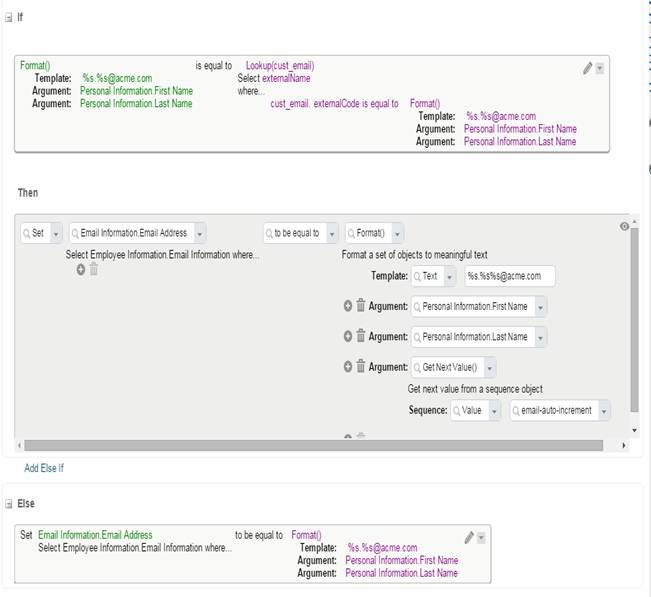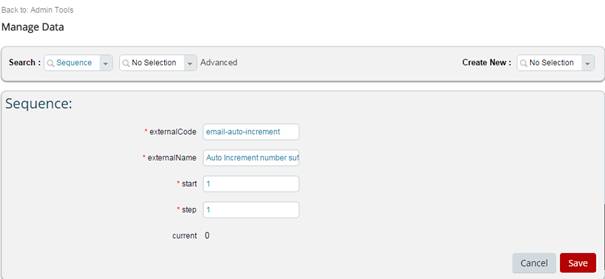
- SAP Community
- Products and Technology
- Enterprise Resource Planning
- ERP Blogs by Members
- Employee Central | Business Rules Engine at work
Enterprise Resource Planning Blogs by Members
Gain new perspectives and knowledge about enterprise resource planning in blog posts from community members. Share your own comments and ERP insights today!
Turn on suggestions
Auto-suggest helps you quickly narrow down your search results by suggesting possible matches as you type.
Showing results for
Former Member
Options
- Subscribe to RSS Feed
- Mark as New
- Mark as Read
- Bookmark
- Subscribe
- Printer Friendly Page
- Report Inappropriate Content
02-12-2015
1:52 PM
**This blog is obsolete. There're far better and easier ways to address the problem**
Recently a customer I am consulting for came up with a not-so-unique requirement. For privacy reasons let’s call the customer acme and acme’s requirement was to automatically generate email addresses for the employees they hired.
Requirement:
If Walter White were to be hired at Acme, his email address would have to be Walter.White@acme.com
Seems easy - Doesn’t it? But not when you have to factor in for the duplicates in the system.The following blog elucidates how a combination of MDF Object, Business Rules and a custom integration process came together to fulfill acme’s requirement and saved the day.
First Things First: Create a Business rule that's always true
Navigation: EC-> Admin Tools -> Search for Configure Business Rules
Create the rule "gen-uniq-email" as per this screen grab here.

Points to be noted:
- Base object has to be Employee Information as you need this rule to kick in while hiring.
- Format() is a function that comes shipped. There are many other useful functions that you can use out of the box. Look up for the complete list here https://partners.successfactors.com/productcentral/PSDocuments/RulesEngineHandbook.pdf
- You can also perform this activity in the data model xml provided you have access to provisioning.
Format() lets you use java style runtime variables %s. The rule here essentially means replace the first %s with the first name and the next %s with the last name of the employee.
Now tie the business rule you created with the field in question i.e., email
Navigation:EC->Admin Tools-> Search for “Manage Business Configuration”

Let's take our rule for a spin by trying to hire an employee.
Navigation: EC->Admin Tools-> Search for 'Add New Employee'

Walter White translates to Walter.White@acme.com – all good!

Now what happens when acme has another Walter White coming on board? Email duplication issues!
Solution
The solution is fairly simple. Just create the email address in the rule and check for its availability in the EC database. If already available, suffix the email with an incremental number, else, just use the email. But…
- There is no way to access employee email data either via a function or via an API call at the business rule level => we got to create our own email store – we do that with an MDF object.
- The business rule framework also doesn’t provide a way to create an entry in the MDF object. Hence we have to populate the MDF object with via an external contrivance – a custom BOOMI process to be precise.
Step 1: Create MDF Object - cust_email
Navigation:EC->Admin Tools-> Search for “Configure Object Definitions”.
Just create an object with effective dating set to none, API visibility set to editable and retain the External Code and Name. Everything else is optional and can be configured on a need basis.

Now get object cust_email into the business rule
For the moment let’s assume that the aforementioned BOOMI process already exists and keeps the MDF object cust_email afresh with all the new email addresses as and when they are generated.
With that assumption let’s understand the business rule here.
For starters, there is an if statement. The if statement checks for the existence of the email address in the MDF object. If it does exist-> then suffix the email address with an incremental number else just use the email address.
the Then Statement has a few new faces
- Format template now reads - %s.%s%s@acme.com
- The third argument is basically the suffix. E.g. Walter.White1@acme.com. So how do we get such a suffix generated?
- We can use the standard function GetNextValue() along with the MDF object Sequence to achieve the incremental behavior of the suffix. In this rule email-auto-increment is one specific Sequence object

So the Sequence object has to be created beforehand.
Navigation:EC->Admin Tools-> Search for “Manage Data” -> Create new sequence.
The sequence starts with the number 1 and it’s auto-incremented in steps of 1.

Now the business rule as such is in place. Provided the cust_email object is updated every now and then we are assured of a unique email address every time a new person is hired.
Let’s shift our crosshairs to the elephant in the room i.e., the BOOMI process.
BOOMI process
The process is pretty straight forward. Every now and then (as scheduled) the process comes alive, reads the latest emails from the SF Object PerEmail and writes it into our custom MDF object cust_email.

All good? Now let's hire another Walter White.

The new Walter White has a different email id from the previous one - serves the purpose
FAQ
Why do we need a BOOMI process here?
- Because we cannot update the MDF object directly from within the rules engine.
Is BOOMI process to only way do this?
- No, MDF objects offer OData APIs. Technically we can use any other contrivance to achieve this so long it can be scheduled to run every now and then.
To conclude:
Business Rules Engine is fabulous with a lot of in built feature-functions.
Nevertheless it would be great to see a spruced up Business Rules framework that can write, as against only read now, into MDF objects directly, perform basic string functions like search-replace and if it's not a tall ask - provide ability to access APIs, external and internal.
With such features, Business Rules Engine can help not only business processes but also tactical integrations. While the strategic A2A integrations take the BOOMI/HCI route, tactical integrations like creating asana/jira tasks for impending HR tasks or streaming updates to progress trackers can definitely take this route.
- SAP Managed Tags:
- HCM (Human Capital Management)
26 Comments
You must be a registered user to add a comment. If you've already registered, sign in. Otherwise, register and sign in.
Labels in this area
-
"mm02"
1 -
A_PurchaseOrderItem additional fields
1 -
ABAP
1 -
ABAP Extensibility
1 -
ACCOSTRATE
1 -
ACDOCP
1 -
Adding your country in SPRO - Project Administration
1 -
Advance Return Management
1 -
AI and RPA in SAP Upgrades
1 -
Approval Workflows
1 -
ARM
1 -
ASN
1 -
Asset Management
1 -
Associations in CDS Views
1 -
auditlog
1 -
Authorization
1 -
Availability date
1 -
Azure Center for SAP Solutions
1 -
AzureSentinel
2 -
Bank
1 -
BAPI_SALESORDER_CREATEFROMDAT2
1 -
BRF+
1 -
BRFPLUS
1 -
Bundled Cloud Services
1 -
business participation
1 -
Business Processes
1 -
CAPM
1 -
Carbon
1 -
Cental Finance
1 -
CFIN
1 -
CFIN Document Splitting
1 -
Cloud ALM
1 -
Cloud Integration
1 -
condition contract management
1 -
Connection - The default connection string cannot be used.
1 -
Custom Table Creation
1 -
Customer Screen in Production Order
1 -
Data Quality Management
1 -
Date required
1 -
Decisions
1 -
desafios4hana
1 -
Developing with SAP Integration Suite
1 -
Direct Outbound Delivery
1 -
DMOVE2S4
1 -
EAM
1 -
EDI
2 -
EDI 850
1 -
EDI 856
1 -
EHS Product Structure
1 -
Emergency Access Management
1 -
Energy
1 -
EPC
1 -
Find
1 -
FINSSKF
1 -
Fiori
1 -
Flexible Workflow
1 -
Gas
1 -
Gen AI enabled SAP Upgrades
1 -
General
1 -
generate_xlsx_file
1 -
Getting Started
1 -
HomogeneousDMO
1 -
IDOC
2 -
Integration
1 -
Learning Content
2 -
LogicApps
2 -
low touchproject
1 -
Maintenance
1 -
management
1 -
Material creation
1 -
Material Management
1 -
MD04
1 -
MD61
1 -
methodology
1 -
Microsoft
2 -
MicrosoftSentinel
2 -
Migration
1 -
MRP
1 -
MS Teams
2 -
MT940
1 -
Newcomer
1 -
Notifications
1 -
Oil
1 -
open connectors
1 -
Order Change Log
1 -
ORDERS
2 -
OSS Note 390635
1 -
outbound delivery
1 -
outsourcing
1 -
PCE
1 -
Permit to Work
1 -
PIR Consumption Mode
1 -
PIR's
1 -
PIRs
1 -
PIRs Consumption
1 -
PIRs Reduction
1 -
Plan Independent Requirement
1 -
Premium Plus
1 -
pricing
1 -
Primavera P6
1 -
Process Excellence
1 -
Process Management
1 -
Process Order Change Log
1 -
Process purchase requisitions
1 -
Product Information
1 -
Production Order Change Log
1 -
Purchase requisition
1 -
Purchasing Lead Time
1 -
Redwood for SAP Job execution Setup
1 -
RISE with SAP
1 -
RisewithSAP
1 -
Rizing
1 -
S4 Cost Center Planning
1 -
S4 HANA
1 -
S4HANA
3 -
Sales and Distribution
1 -
Sales Commission
1 -
sales order
1 -
SAP
2 -
SAP Best Practices
1 -
SAP Build
1 -
SAP Build apps
1 -
SAP Cloud ALM
1 -
SAP Data Quality Management
1 -
SAP Maintenance resource scheduling
2 -
SAP Note 390635
1 -
SAP S4HANA
2 -
SAP S4HANA Cloud private edition
1 -
SAP Upgrade Automation
1 -
SAP WCM
1 -
SAP Work Clearance Management
1 -
Schedule Agreement
1 -
SDM
1 -
security
2 -
Settlement Management
1 -
soar
2 -
SSIS
1 -
SU01
1 -
SUM2.0SP17
1 -
SUMDMO
1 -
Teams
2 -
User Administration
1 -
User Participation
1 -
Utilities
1 -
va01
1 -
vendor
1 -
vl01n
1 -
vl02n
1 -
WCM
1 -
X12 850
1 -
xlsx_file_abap
1 -
YTD|MTD|QTD in CDs views using Date Function
1
- « Previous
- Next »
Related Content
- Building Low Code Extensions with Key User Extensibility in SAP S/4HANA and SAP Build in Enterprise Resource Planning Blogs by SAP
- Employee synch to Business Partner in Enterprise Resource Planning Q&A
- Manage Supply Shortage and Excess Supply with MRP Material Coverage Apps in Enterprise Resource Planning Blogs by SAP
- The Role of SAP Business AI in the Chemical Industry. Overview in Enterprise Resource Planning Blogs by SAP
- Introducing the GROW with SAP, core HR add-on in Enterprise Resource Planning Blogs by SAP
Top kudoed authors
| User | Count |
|---|---|
| 2 | |
| 2 | |
| 2 | |
| 2 | |
| 2 | |
| 1 | |
| 1 | |
| 1 | |
| 1 | |
| 1 |